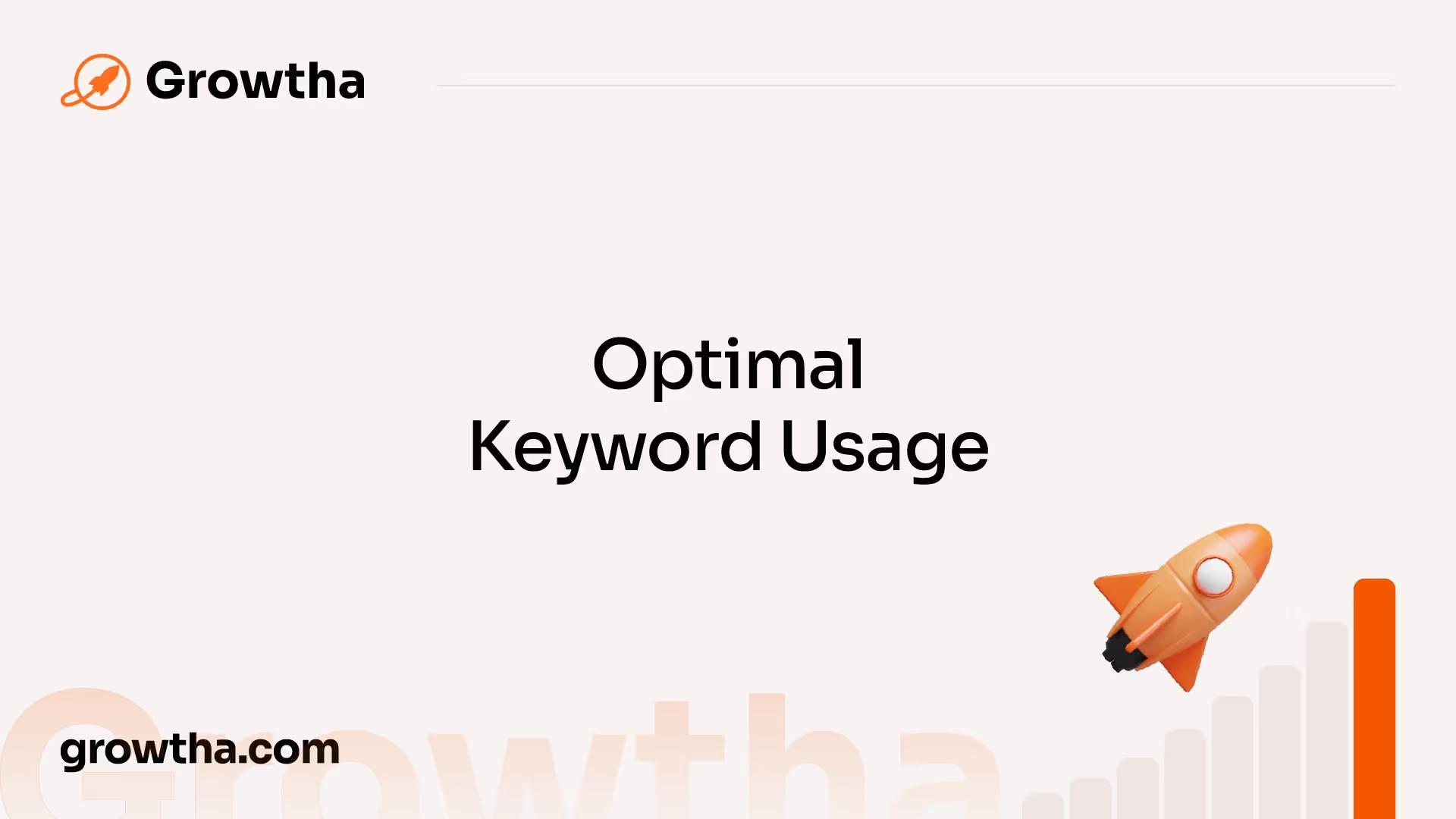How Many Keywords Should I Use for SEO?
Keyword research is a fundamental aspect of SEO that involves identifying the words and phrases people use when searching for information, products, or services online.


How Many Keywords Should I Use for SEO?
Understanding Keyword Research

Keyword research is a fundamental aspect of SEO (Search Engine Optimization) that involves identifying the words and phrases people use when searching for information, products, or services online. By understanding the importance of keyword research and utilizing the right tools, businesses can optimize their websites and content to increase visibility and attract relevant traffic.
Importance of Keyword Research
Keyword research is essential for several reasons. First and foremost, it helps businesses gain insights into their target audience's search behavior and preferences. By identifying the keywords and phrases commonly used in search queries related to their industry, businesses can align their content and website optimization strategies accordingly.
Moreover, effective keyword research enables businesses to uncover new opportunities and niches. By identifying less competitive or untapped keywords, businesses can tailor their content to cater to specific needs and interests, allowing them to stand out from the competition.
Tools for Keyword Research

Keyword research tools play a crucial role in the process of identifying relevant keywords and analyzing their potential. These tools provide valuable insights into search volume, keyword difficulty, and related search terms, allowing businesses to make informed decisions about the keywords they should target.
One popular keyword research tool is the Keyword Magic Tool by Semrush, which offers access to a comprehensive database of over 25.5 billion keywords. This tool allows users to search for specific keywords and provides valuable data to help businesses refine their keyword strategies.
In addition to dedicated keyword research tools, businesses can also leverage Google Search Console (GSC) to gain insights into the keywords their website ranks for. GSC provides information about the most popular keywords that drive traffic to a website, helping businesses understand the terms they should prioritize [1].
When conducting keyword research, it's important to consider factors such as search volume, keyword difficulty, and relevance to your target audience. By utilizing comprehensive keyword research tools like Semrush's Keyword Magic Tool and analyzing data from Google Search Console, businesses can optimize their website and content to align with the keywords that matter most to their audience.
In conclusion, keyword research is a critical step in the SEO process. By understanding the importance of keyword research and utilizing the right tools, businesses can gain insights into their target audience, uncover new opportunities, and optimize their website and content to improve visibility and attract relevant traffic.
Keyword Density and SEO

Understanding the relationship between keyword density and SEO is important for optimizing content and improving search engine rankings. In this section, we will explore what keyword density is and its impact on SEO.
What is Keyword Density?
Keyword density refers to the percentage of times a target keyword appears in a piece of content in relation to the total word count. It is calculated by dividing the number of times the keyword appears by the total number of words in the content, and then multiplying by 100.
However, it is important to note that keyword density is no longer a significant ranking factor according to Google. Matt Cutts, the former Head of Web Spam at Google, stated that there is no ideal keyword density and that search engine rankings do not work that way. Google's algorithm updates, such as Hummingbird and RankBrain, have evolved to recognize and discourage keyword stuffing and other ineffective SEO tactics.
Impact of Keyword Density on SEO
Keyword density used to play a more prominent role in SEO strategies, but Google's algorithm updates have shifted the focus towards the overall quality of content and user experience. The Panda update in 2011 marked a significant shift, as Google began prioritizing websites that provided valuable content to users rather than those using keyword stuffing to artificially inflate rankings [2].
The Hummingbird algorithm update in 2013 further emphasized the importance of context and search intent. It shifted the focus from individual keywords to understanding the meaning behind user queries as a whole. This update aimed to provide more relevant search results by analyzing the context and intent of the search rather than solely relying on keyword density [2].
RankBrain, introduced in 2015, is a machine learning-based algorithm that further advanced Google's understanding of search intent. It translates relevant keywords into entities and places more emphasis on context and search intent when ranking pages. This shift highlights the importance of creating high-quality content that addresses user needs rather than obsessing over keyword density [2].
In summary, while keyword density was once considered an important factor in SEO, it has become less relevant as Google's algorithms have evolved. Rather than focusing on keyword density, it is crucial to create valuable, relevant, and user-friendly content that addresses the needs and search intent of your target audience.
Keyword Overuse Risks

When it comes to optimizing content for search engines, finding the right balance in keyword usage is crucial. Overusing keywords can have detrimental effects on your SEO efforts and overall search visibility. In this section, we will explore the consequences of keyword overuse and provide strategies to avoid keyword stuffing.
Consequences of Keyword Overuse
Keyword overuse can lead to several issues that can harm your website's credibility and visibility on search engines. Some of the consequences include:
- Reduced Content Quality: When keywords are excessively used, the natural flow and readability of your content may be compromised. This can make your writing appear forced and unnatural, negatively impacting the user experience and diminishing the quality of your content [3].
- Negative Impact on User Experience: Keyword stuffing can disrupt the natural flow of your content, making it difficult for readers to engage with your website. This can result in a higher bounce rate and lower user satisfaction, ultimately affecting your website's overall performance.
- Search Engine Penalties: Search engines, like Google, are becoming increasingly sophisticated in identifying and penalizing keyword overuse. Red flags are triggered when content appears saturated with keywords, leading to lower search rankings or even temporary removal from search results. This directly impacts your organic traffic and visibility.
- Diminished Long-Term SEO Value: Overusing keywords may provide short-term gains in search rankings. However, search engines are constantly evolving, and modern algorithms are designed to recognize and penalize content that appears excessively optimized. This can result in lower search rankings and decreased organic traffic over time.
Avoiding Keyword Stuffing
To avoid the risks associated with keyword overuse, it's important to employ strategies that maintain a natural and balanced approach to keyword usage. Here are some best practices to avoid keyword stuffing:
- Focus on User Intent: Instead of obsessing over keyword density, prioritize creating high-quality, informative content that satisfies the user's intent. Understand what your target audience is searching for and deliver valuable content that addresses their needs.
- Use Synonyms and Variants: Incorporate variations of your target keywords throughout your content. This not only helps you avoid repetitive usage but also signals to search engines that your content is comprehensive and relevant.
- Write Naturally: Write for your audience, not search engines. Ensure that your content flows naturally and provides a positive reading experience. Avoid forcefully inserting keywords where they don't naturally fit.
- Diversify Your Content: Instead of solely relying on keyword optimization, focus on creating diverse and engaging content that includes relevant topics, headings, and subheadings. This helps search engines understand the overall context and relevance of your content.
By understanding the consequences of keyword overuse and implementing strategies to avoid keyword stuffing, you can maintain a healthy balance in keyword usage. Remember, the primary goal should be to provide valuable content to your audience while optimizing for search engines in a natural and ethical manner.
Optimal Keyword Usage

When it comes to optimizing your content for search engines, finding the right balance in keyword usage is crucial. In this section, we will explore two key aspects of optimal keyword usage: calculating keyword density and incorporating keyword variants.
Calculating Keyword Density
Keyword density refers to the percentage of times a keyword appears in relation to the total number of words on a page. The formula to calculate keyword density is straightforward: divide the number of times a keyword is used on your page by the total number of words on the page. For example, if your page has 1,000 words and your keyword is used 10 times, the keyword density would be 1% [4].
It's important to note that while keyword density was previously considered an important factor for SEO, it is no longer a significant ranking factor according to Google. Matt Cutts, the former Head of Web Spam at Google, stated that there is no ideal keyword density and that search engine rankings do not work in that way. Instead, search engines like Google now focus on the overall quality of content and user experience.
Incorporating Keyword Variants
Rather than obsessing over keyword density, it is more important to focus on incorporating keyword variants throughout your content. Keyword variants are different variations and synonyms of your target keyword. By including these variants, you can provide a more diverse and natural language experience for your readers while still signaling to search engines the relevance of your content.
When incorporating keyword variants, it's essential to maintain a natural flow of language. Avoid overusing or stuffing keywords, as this can lead to penalties from search engines. Instead, aim for a seamless integration of variants that aligns with the context of your content.
By diversifying your keyword usage, you can create well-rounded content that appeals to both search engines and readers. This approach allows you to optimize your content for relevant search queries while maintaining a high-quality user experience.
As search engine algorithms continue to evolve, it's important to stay updated with the latest best practices. The focus has shifted from rigid keyword density to providing valuable content that meets user search intent. With updates like Google's Panda algorithm in 2011 and the Hummingbird algorithm in 2013, search engines now prioritize quality, context, and user intent over keyword stuffing.
In summary, while keyword density is no longer a significant ranking factor, it is still important to include keyword variants throughout your content. By focusing on relevance, quality, and user intent, you can optimize your content effectively for search engines while providing valuable information to your audience.
Evolution of Keyword Strategy
As search engine optimization (SEO) has evolved over the years, so too has the approach to keyword strategy. Understanding the historical shifts in keyword usage and current best practices is essential for effective SEO.
Historical Shifts in Keyword Usage
In the early days of SEO, keyword density played a significant role in determining search engine rankings. Website owners would often focus on cramming as many keywords as possible into their content in an attempt to optimize their pages. However, Google has confirmed that keyword density is not a significant ranking factor. Matt Cutts, the former Head of Web Spam at Google, stated that search engine rankings do not work based on an ideal keyword density. This marked a significant shift away from keyword density as a primary ranking factor.
The Panda update in 2011 further emphasized the importance of quality content over keyword density. Google began to prioritize websites that provided valuable and relevant content to users, rather than those that relied on keyword stuffing to inflate rankings. This update aimed to improve the overall user experience by promoting high-quality content and penalizing websites that engaged in spammy SEO practices.
Current Best Practices
The evolution of Google's search algorithms has led to a shift in keyword strategy. Instead of focusing solely on keyword density, SEO professionals now emphasize the importance of providing valuable and relevant content that meets user search intent.
The Hummingbird algorithm update in 2013 marked a significant turning point. It shifted the focus from individual keywords to search intent, considering the query as a whole rather than individual words within it. Google aimed to understand the context of words in a query to determine user search intent. This update highlighted the importance of creating content that aligns with user needs and intent.
RankBrain, introduced in 2015, further revolutionized keyword strategy. It utilizes a machine learning-based algorithm to understand the meaning behind search queries. RankBrain focuses on context, search intent, and user experience rather than keyword density. It translates relevant keywords into entities and emphasizes context and search intent in ranking pages. This shift reinforces the importance of creating high-quality, user-focused content that addresses the needs and queries of your target audience.
Today, keyword strategy involves incorporating relevant keywords naturally throughout the content, prioritizing user experience, and aligning with search intent. Rather than obsessing over keyword density, it is crucial to focus on providing valuable, informative, and engaging content that satisfies the needs of users and encourages them to stay on your website.
As search engine algorithms continue to evolve, it is essential to stay informed about the latest SEO trends and best practices. By keeping up with these changes and adapting your keyword strategy accordingly, you can optimize your website for better visibility and improved rankings.
SEO Ranking Factors
When it comes to optimizing your website for search engines, understanding the relevance of keywords and how they are used in Google's search algorithms is crucial. Let's explore the importance of keywords and how Google determines the relevance of a webpage.
Relevance of Keywords
Google's systems analyze content to assess relevance by examining whether the information contains the same keywords as the search query. If the keywords appear on the page, in headings, or in the body of the text, the information might be considered more relevant [5]. However, Google's algorithms go beyond just keyword matching.
Google's algorithms also assess whether a page contains additional relevant content beyond the specific keyword used in the search query. For example, if someone searches for "dogs," the algorithms look for supplementary relevant content such as pictures of dogs, videos, or a list of breeds, rather than just the word "dogs" repeated multiple times on a page.
Moreover, Google's systems aim to prioritize content that demonstrates expertise, authoritativeness, and trustworthiness. Factors such as the presence of links from other prominent websites, among others, help determine the quality of information and its trustworthiness [5].
Google's Search Algorithms
Over the years, Google's algorithms have evolved to provide more accurate and relevant search results. Algorithm updates like Hummingbird and RankBrain have shifted the focus away from keyword density as a primary ranking factor and towards the overall quality of the content on a webpage. Google now emphasizes websites that offer valuable and informative content to users, rather than those using keyword stuffing to artificially inflate rankings.
These updates have made it essential for website owners to focus on producing high-quality content that meets the needs and interests of their target audience. Keyword usage should be natural and aligned with the context of the content, rather than excessive repetition of specific keywords.
While using relevant keywords in your content is important for SEO, it is equally crucial to create valuable and engaging content that provides a great user experience. By striking a balance between keyword optimization and high-quality content, you can enhance your website's visibility and improve its chances of ranking well in search engine results.
Understanding the relevance of keywords and staying up to date with Google's evolving search algorithms will help you develop an effective SEO strategy that drives organic traffic and improves your website's overall performance.
References
[1]: https://www.semrush.com/blog/keyword-research/
[2]: https://www.semrush.com/blog/keyword-density/
[3]: https://thezoeteam.com/blog/keyword-overuse-in-seo
[4]: https://blog.hubspot.com/marketing/keyword-density
[5]: https://www.google.com/search/howsearchworks/how-search-works/ranking-results/







